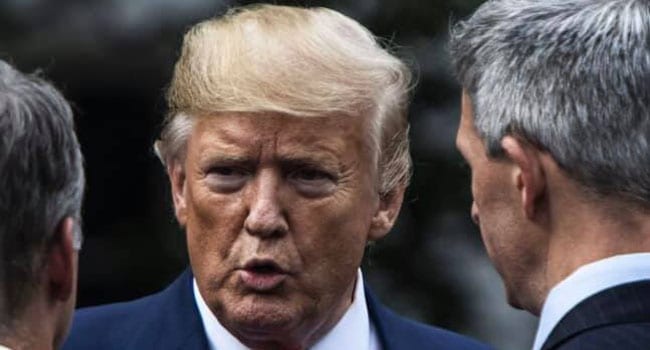 The impeachment inquiry against U.S. President Donald Trump has been moving full steam ahead.
The impeachment inquiry against U.S. President Donald Trump has been moving full steam ahead.
The House Intelligence Committee heard several testimonies, including Gordon Sondland (U.S. ambassador to the European Union), Admiral Alexander Vindman (National Security Council director for European affairs) and Marie Yovanovitch (former U.S. ambassador to Ukraine).
The House Judiciary Committee is in the middle of its own hearings and will draft the articles of impeachment shortly.
There will likely be a vote in the House of Representatives on or before Christmas and the matter will then move on to the Senate.
Don’t be surprised by any of this.
What we’re witnessing isn’t something akin to a court of law, but rather a heavily politicized show trial. The acts in this pseudo-play were written by partisan Democrats long before the impeachment inquiry began on Sept. 24. They conveniently used a whistleblower account suggesting Trump had improperly withheld funds from Ukrainian President Volodymyr Zelensky for personal and political purposes (the so-called quid pro quo) as a means of showing, in their minds, he had abused his power.
In reality, the Trump-Zelensky conversation is a matter of interpretation. World leaders discuss many things in private, and occasionally ask for help or advice. It’s unusual for it to be tied to a leader’s election or re-election bid, but it’s not entirely clear anything improper or illegal was discussed. The White House transcripts that have been released don’t show this.
Meanwhile, the allegation of withholding financial aid in exchange for Ukraine looking into the business dealings of Democratic presidential candidate Joe Biden’s son is eyebrow-raising. But when you think about Hunter Biden’s lack of experience to serve as a board member of a Ukrainian natural gas producer, Burisma Holdings, and the fact it happened during the time his father was vice-president, wouldn’t that raise some red flags for you, too?
As for the whistleblower account, it’s titillating but needs to be treated with caution. If you look at the history of whistleblowing with a fine-tooth comb, some participants have been selfless and patriotic while others have been selfish and motivated by personal or political gain. It remains to be seen on which side of history the (somewhat) anonymous whistleblower will be placed.
The pseudo-play’s final act isn’t difficult to predict, either. The Democratic-controlled House of Representatives will likely impeach Trump and the Republican-controlled Senate will likely acquit him.
Could this scenario change?
Yes, but it would require an enormous shift to the political narrative that we haven’t seen to date.
Trump will, therefore, likely end up as the third U.S. president to be impeached.
The two previous examples are Andrew Johnson in 1868 (violation of the Tenure of Office Act) and Bill Clinton in 1998 (lying under oath, obstruction of justice). Neither man received the two-thirds majority vote of senators that would have found him guilty of high crimes and misdemeanours as laid out in the U.S. constitution.
While many people assume Richard Nixon is on this list, he’s not. While there’s no question he would have been impeached in 1974 due to Watergate, his resignation was submitted before any congressional votes were recorded.
All in all, nothing much will ultimately be accomplished by Trump’s impeachment inquiry. But one big question mark will linger for some time.
Constitutional experts and political analysts (liKe me) are concerned that a precedent has been set for Democrats and Republicans to use the threat of impeachment as a political weapon. In other words, it would enable them to attempt to remove a president they don’t particularly like for reasons that aren’t particularly compelling or even truthful.
That would create a permanent black mark on the constitutional legacy set by America’s founding fathers more than two centuries ago. The articles of impeachment were put in place with a specific purpose in mind. Crafty political games and strategic manoeuvring shouldn’t ever be part of the equation.
If Trump is re-elected in 2020 and faces another impeachment inquiry, our worst fears will be realized.
Michael Taube, a Troy Media syndicated columnist and Washington Times contributor, was a speechwriter for former prime minister Stephen Harper. He holds a master’s degree in comparative politics from the London School of Economics.
The views, opinions and positions expressed by columnists and contributors are the author’s alone. They do not inherently or expressly reflect the views, opinions and/or positions of our publication.

